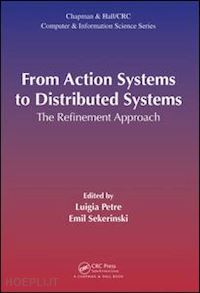I: MODELINGModelling Sources for Uncertainty in Environmental MonitoringMauno RönkköIntroductionHybrid Action SystemsEnvironmental MonitoringCase Study: Monitoring Room TemperatureConclusionMandatory and Potential Choice: Comparing Event-B and STAIRS Atle Refsdal, Ragnhild Kobro Runde, and Ketil StølenIntroduction Kinds of ChoiceComparing Event-B and STAIRS at the Syntactic Level Interaction-Obligations versus Failure-DivergencesConclusionModelling and Refining Hybrid Systems in Event-B and Rodin Michael Butler, Jean-Raymond Abrial, and Richard BanachIntroductionReals and Continuous FunctionsModelling a Continuous Control GoalDistinguishing ModesModelling the Control StrategyMerging Big and Small Step VariablesDerivativesConcludingII:ANALYSISModelling and Analysis of Component Faults and Reliability Thibaut Le Guilly, Petur Olsen, Anders P. Ravn, and Arne SkouIntroductionA Development and Analysis ProcessExampleDiscussion, Conclusion, Related and Further WorkVerifiable Programming of Object-Oriented and Distributed SystemsOlaf OweIntroductionBasic Programming ConstructsClass InvariantsInheritanceLocal ReasoningDiscussion of Future-Related MechanismsConclusionA Contract-Based Approach to Ensuring Component Interoperability in Event-BLinas Laibinis and Elena TroubitsynaIntroductionBackground: Event-BFrom Event-B Modelling to ContractsExample: an Auction SystemConclusions III: PROOF Meeting Deadlines, Elastically Einar Broch Johnsen, Ka I Pun, Martin Steffen, S. Lizeth Tapia Tarifa, and Ingrid Chieh YuIntroductionService Contracts as InterfacesA Kernel Language for Virtualized ComputingExample: A Photo Printing ShopProof SystemRelated WorkDiscussionEvent-B and Linear Temporal Logic Steve Schneider, Helen Treharne, and David M. WilliamsIntroductionEvent-BLTL NotationPreserving LTL Properties in Event-B Refinement ChainsDiscussion and Related WorkConclusion A Provably Correct Resilience Mediator Pattern Mats Neovius, Mauno Rönkkö, and Marina WaldénIntroductionProvably Correct Stepwise Development with Action SystemsResilience MediatorFormal Development of the Resilience Mediator PatternDiscussion and ConclusionIV:REFINEMENT Relational Concurrent Refinement - Partial and Total Frameworks John Derrick and Eerke BoitenIntroductionModels of Refinement Using a Partial Framework to Embed Concurrent Refinement RelationsA Total Relational FrameworkA General Framework for Simulations - Process Data TypesConclusionsRefinement of Behavioural Models for Variability Description Alessandro Fantechi and Stefania GnesiIntroductionRunning Example and BackgroundBehavioural Models and VariabilityA Comparison on the Expressiveness11.5 Conclusions Acknowledgments Integrating Refinement-Based Methods for Developing Timed Systems Jüri Vain, Leonidas Tsiopoulos, and Pontus BoströmIntroductionRelated Work PreliminariesMapping from Event-B Models to UPTAIEEE 1394 Case StudyRefinement of Timed SystemsConclusion and Future WorkV:APPLICATIONS Action Systems for Pharmacokinetic Modeling M.M. Bonsangue, M. Helvensteijn, J.N. Kok, and N. KokashIntroductionActions and Action SystemsPharmacokinetic ModelingConclusions and Future WorkQuantitative Model Refinement in Four Different Frameworks Diana-Elena Gratie, Bogdan Iancu, Sepinoud Azimi, and Ion PetreIntroductionQuantitative Model RefinementCase Study: the Heat Shock Response (HSR)Quantitative Refinement for ODE ModelsQuantitative Refinement for Rule-Based ModelsQuantitative Refinement for Petri Net ModelsQuantitative Refinement for PRISM ModelsDiscussionDeveloping and Verifying User Interface Requirements for Infusion Pumps: A Refinement ApproachRimvydas Rukš?enas, Paolo Masci, and Paul CurzonIntroductionSample User Interface Requirements from FDABackgroundThe Requirement HierarchiesVerification of Concrete InterfacesConclusionsSelf-Assembling Interactive Modules: A Research Programme Gheorghe StefanescuTiling - a Brief IntroductionTwo-Dimensional Languages: Local vs. Global Glueing ConstraintsStructural Characterisation for Self-Assembling TilesInteractive ProgramsConclusionsBibliography












